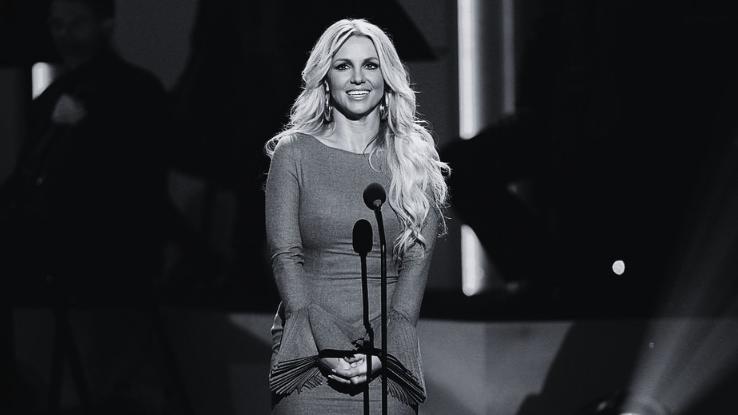
Britney Spears rose to superstardom in the late 1990s and is commonly referred to as the “Princess of Pop.” But, unfortunately, the singer’s phenomenal success was followed by damaging media coverage. Tabloids looking to sensationalize Britney’s life did so to the detriment of the singer’s mental health — and the consequences have been lasting.
In 2008, closed door legal proceedings led to the pop star being placed under a strict conservatorship. The conservatorship, which is governed by her father, Jamie Spears, has not only stripped the singer of her agency, but it has cast a harsh light on how mental health is covered and discussed at large. Now, over a decade later, Spears, 39, is still under that conservatorship, and, in the wake of the new New York Times documentary Framing Britney Spears, the #FreeBritney movement has seen a recent resurgence.
How Did the Conservatorship Come About?
By the mid-2000s, the stress of superstardom and constant public scrutiny had taken an emotional toll on Britney — and tabloids were more than eager to take advantage of that, sensationalizing and pathologizing her every action. Despite the barrage of misinformation and prying photographers, Britney checked into a mental health facility, but the intrusive headlines kept coming.
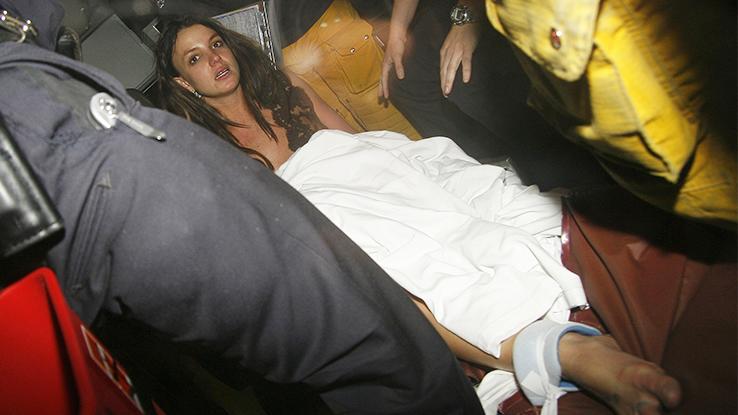
In fact, she ended up losing custody of her two sons, whom she’d had with ex-husband Kevin Federline. Additionally, her father petitioned the California courts to take control of Britney’s personal, financial and medical decisions via a conservatorship. The court-approved mandate made the pop star a ward of her father’s — and, as such, he was granted control of her $47 million estate and her personal and professional activities. After six months, the temporary conservatorship became permanent; the documents have always remained sealed, so the exact reasons for the decision are unknown. In the 2008 MTV documentary Britney: For the Record, Britney compared the conservatorship to being incarcerated, calling her situation “never-ending.”
The Rise of the #FreeBritney Movement
As early as 2009, fans of Britney — who believe the singer is being unfairly held “captive” by her family and management team — started the #FreeBritney campaign to demand her release from the conservatorship (via Rolling Stone). Around this time, Britney recorded her sixth album, Circus; appeared on the MTV Video Music Awards; and toured, but fans continued to speak out on the singer’s behalf. In response to the public backlash to the conservatorship, a lawyer claiming to represent Britney — who the singer couldn’t have hired herself under the terms of the conservatorship — failed to get any restrictions removed, with the judge declaring that doing so would be a “travesty of justice.”
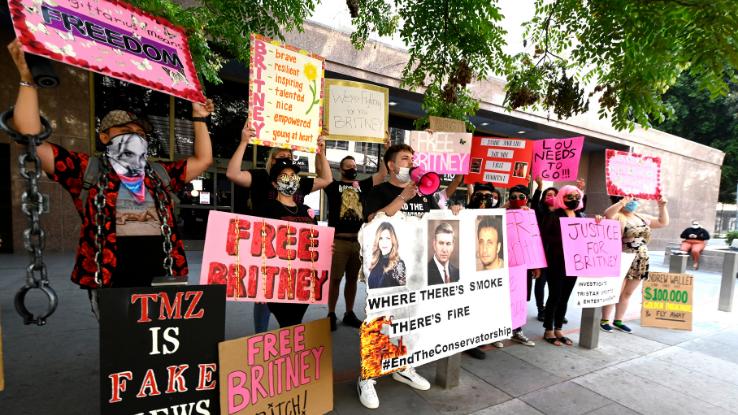
In the years that followed, Britney began a four-year Las Vegas residency while continuing to release new music and tour. Her father has maintained complete control of her financial, personal and professional decisions. Additionally, she is closely monitored by “handlers” and doesn’t have access to email. In fact, Britney can’t file her own tax returns or “pursue opportunities related to professional commitments,” including “performances, music recording, music videos, tours, TV shows and other similar activities,” without the consent of her medical team.
Fans Aim to Expose the Corruption of the Conservatorship
As the Washington Post reported on May 17, 2019, “Sources close to the singer are pushing back on the #FreeBritney narrative, emphasizing that Spears is in the conservatorship for a reason — long-term mental-health issues that they would not specify. They know #FreeBritney is born out of fans’ love for her, they say, but insist that fans don’t understand the details of Spears’ condition and the logistics of the legal arrangement, which is monitored closely by medical professionals and the courts.”

Her manager, Larry Rudolph, said, “The last thing any California state judge wants is to do something incorrectly and inappropriately and be the subject of a story about a judge that has done something wrong to Britney Spears.” He goes on to insist the conservatorship “helps Britney make business decisions and manage her life in ways she can’t do on her own right now.” After her father became ill with a life-threatening colon condition, the personal components of the conservatorship were transferred to Jodi Montgomery, a longtime employee dubbed Britney’s “care manager.”
In early January 2019, just before her second Las Vegas residency, Britney posted an announcement on her website. “This is so tough for me to say,” the statement said. “I will not be performing my new show Domination. I’ve been looking forward to this show and seeing all of you this year, so doing this breaks my heart. However, it’s important to always put your family first, and that’s the decision I had to make.”
Millions of dollars were already invested in the Las Vegas residency, so the decision led to a surge in theories about the cancellation. One key point of interest was that the original attorney working with Jamie Spears resigned only a few months after requesting a raise. Additionally, in April 2019, People claimed that Britney “checked into a facility for ‘all-encompassing wellness treatment’ and needed to focus on herself.”
Some criticize the #FreeBritney movement because the supporters of it lack “first-hand knowledge” of the situation. Nonetheless, her die-hard fans stress that, unlike the tabloids, they don’t speculate on Britney’s mental health. Instead, their aim is to expose the corruption of the conservatorship and the ways people are continuing to benefit financially from Britney’s career at the expense of her agency and health.
“Framing Britney Spears” & the #FreeBritney Movement in 2021
Over the summer in 2020, Britney posted videos and photos on Instagram, reigniting the #FreeBritney movement. In mid-August 2020, Britney’s attorney requested a substantial amendment to the conservatorship, which was set to expire on August 22. Despite Britney’s opposition to her father’s continued control and his request for a co-conservator, a judge extended Jamie Spears’ control until February 2021. Now, Britney’s father is a co-conservator alongside the Bessemer Trust Company.
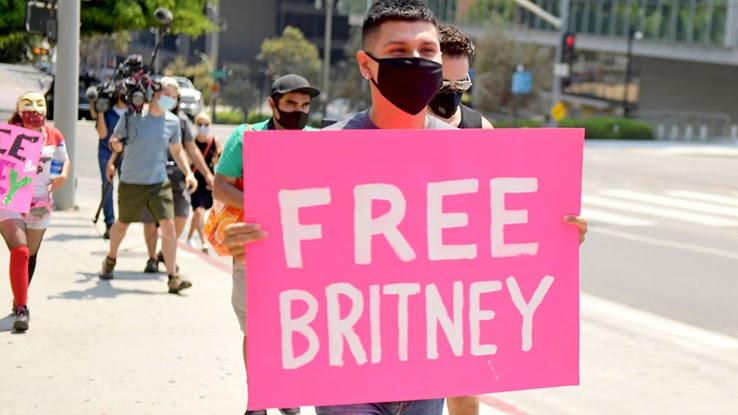
As that 2021 date nears, The New York Times‘ new documentary, Framing Britney Spears, has debuted on FX and Hulu. “While Spears’ legal battles are well-publicized, the documentary also touches on themes of media bias and mental health,” Rolling Stone notes, “especially when addressing the star’s supposed ‘breakdown'” in 2007. As the doc illustrates, when it comes to celebrities and mental illness, we need to stop gawking at mental illness or making celebrity’s actions into memes and soundbites.
This starts with how mental illness and conditions are covered by media, and how we talk about mental health at large. Bassey Ikpi, author of I’m Telling the Truth, but I’m Lying: Essays, has publicly advocated for the media to reassess how it covers celebrity mental illness and the actions that stem from living with said illnesses. “Mental illness is not an excuse, but it is a reason,” Ikpi told WBUR. “And it has to be contextualized. It has to be framed so that people understand that the way that one behaves is the literal definition of what a mental illness is.”
Of course, unlike most other celebrities, Britney’s situation is complicated further by the abusive actions of those around her. Nonetheless, the #FreeBritney movement helps to underscore the importance of supporting folks in the spotlight and spreading real awareness about mental health. After all, it’s abundantly clear that sensationalized tabloids, soundbites and memes have had an enduring impact on Britney’s life.
Stronger Than Yesterday? Britney’s Bombshell Testimony
On June 24, 2021, a status hearing was held regarding the conservatorship and the possibility of ending it. There, Spears could finally tell the world what has been going on in her own words. She referred to the conservatorship as “abusive,” and went on to say that she “can’t sleep.”
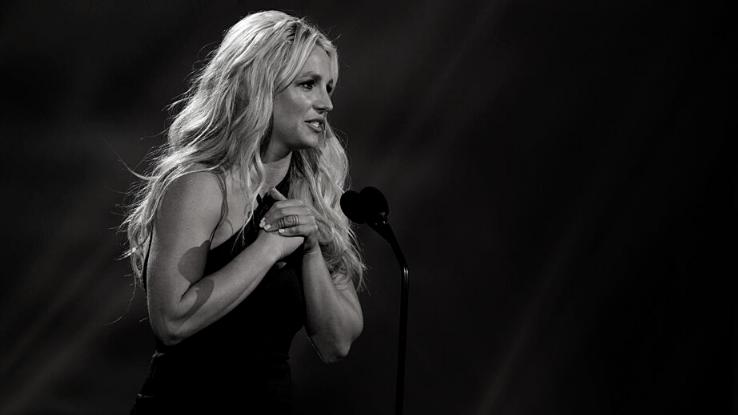
She had posted several selfies on Instagram in 2020, claiming that she was okay and doing well, but Spears said that she was in denial during that time. Spears took the opportunity to tell her side of the story, asserting that it is perfectly alright to say “no” to a dance move, that she takes her medication in the mornings, so how could managers accuse her of not taking meds if they never see her when she takes them?
Of Spears’s 24-minute testimony, news regarding the treatment of the pop star’s body was quick to shock the world. Spears wants to marry and have another child. However, she’s not even allowed to be in a car with her boyfriend.
“I want to get married and have a baby. I was told I couldn’t get married. I have an IUD inside me but this so-called team won’t let me go to the doctor to remove it because they don’t want me to have children. This conservatorship is doing me way more harm than good.”
News about the IUD was particularly upsetting. This revelation is certain to spark debates over mental health and reproductive rights. IUD is short for intrauterine device. These devices are interested into the uterus as a method of birth control. To have an IUD in one’s body against one’s consent could be interpreted as a violation of one’s human rights. When people chant, “Free Britney!” it’s for the liberty to be able to make this choice for themselves, or to have the right person doing it for them.
So far, Jamie Spears’s only comment is that he loves his daughter and misses her. Pop stars such as Brandy, Mariah Carey, Halsey and many other celebrities have expressed their concern and support for the beloved icon.
In the last decade, the treatment of Britney Spears has gone from #LeaveBritneyAlone to #FreeBritney. Surely she deserves to be freed from her conservatorship. But, could the next phase in Britney’s long saga be #ListentoBritney? Listening to victims is important, so perhaps this could spark conversation about how to help survivors of abuse feel comfortable enough to come forward.
It’s clear that, given space and proper support to speak out, Britney Spears was able to paint a clearer picture of what was really going on in her conservatorship and this may lead to a speedy decision to end the 13-year long conservatorship with her father. Whether or not this will result in a different conservatorship or emancipation for Spears is unclear. We hope that, no matter the result, Spears continues to use her voice.






